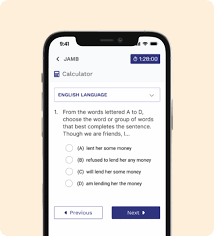Physical Address
304 North Cardinal St.
Dorchester Center, MA 02124

Your dream of becoming a top Civil Engineer starts here. Understanding the subjects for civil engineering in JAMB could be the make-or-break moment that determines whether you step into your dream university or face another year of uncertainty. The subjects needed for Civil Engineering in Jamb are Maths, English, Physics and Chemistry.
Imagine acing Physics, and all the right subjects, while others struggle with their choices. Get the subjects for civil engineering in JAMB right, and you’re not just competing, you’re leading. Ready to unlock the secrets to success? Let’s get in and prepare to conquer JAMB with the ExcelMind app like a pro.

See Also: Master the Subjects for Architecture in JAMB & Achieve Your Dream
Choosing the right subjects for civil engineering in JAMB is crucial. JAMB (Joint Admissions and Matriculation Board) is the gateway to Nigerian universities, and your subject choices will determine if you are eligible to study Civil Engineering.
The basic subjects required include Physics, Chemistry, and Mathematics—subjects that lay the foundation for understanding how buildings, roads, and bridges are designed and built.
Here’s a detailed look at the subjects for civil engineering in JAMB that you’ll need:

While Physics, Chemistry, Mathematics, and English are essential, other subjects can make your journey easier:
Many students focus on passing their subjects without truly understanding the basics. But these basics are crucial. For example, understanding Physics concepts like gravity and motion will make it easier to grasp university-level topics like structural analysis. This is where the ExcelMind app comes in, making learning fun and easy.
The ExcelMind app is a game-changer for students. It provides practice questions, detailed explanations, and past JAMB questions. It’s like having a personal tutor in your pocket, helping you build a strong foundation in Physics, Chemistry, and Mathematics. By using the ExcelMind app, you can practice these subjects anytime, anywhere, ensuring you’re always prepared.
The journey to becoming a Civil Engineer goes beyond books. Engaging in extracurricular activities can build practical skills that set you apart from other candidates. For example:
These activities not only make your university application stronger but also prepare you for the real challenges in Civil Engineering.
The ExcelMind app is the number one solution for students aiming to pass the JAMB exam with ease. Here’s why:

Understanding the subjects for civil engineering in JAMB is only the first step. Here are more strategies to increase your chances of success:
Read Also: Top Subjects for Business Administration in JAMB: Achieve Your Dream
Getting into Civil Engineering isn’t just about passing JAMB; it’s about mastering the subjects for civil engineering in JAMB and building a solid foundation for your future. With Physics, Chemistry, Mathematics, and English as your main subjects, plus the right tools like the ExcelMind app, you’ll be on your way to success.
Ready to take control of your future? Download the ExcelMind app now and start practising for the JAMB exam. With the right preparation, nothing can stop you from gaining admission into your dream university to study Civil Engineering.
The subjects for Civil Engineering in JAMB are:
Physics
Chemistry
Mathematics
English Language
To study Civil Engineering in Nigerian universities, you need to meet the following requirements:
JAMB UTME Requirements:
Must sit for four subjects in JAMB: Physics, Chemistry, Mathematics, and English Language.
Achieve the minimum JAMB score required by the chosen university.
O’Level Requirements:
Five SSCE credit passes in these subjects: Physics, Chemistry, Mathematics, English Language, and one other Science subject (e.g., Biology, Geography, or Technical Drawing).
Credits should be obtained in not more than two sittings.
Direct Entry Requirements (For candidates seeking admission into 200-level):
A-Level passes in Physics and Mathematics.
ND/HND with upper credit in Civil Engineering or a related field from an accredited institution.
Relevant NCE with a merit pass.
Special Considerations (Waivers):
Some universities may have additional or slightly different requirements, such as accepting a pass in English or requiring Further Mathematics. It’s essential to check the specific requirements of the chosen university.
Engineering Mechanics, Design of Bridges, and Geotechnical Engineering are among the most challenging courses in civil engineering. Although every civil engineering course presents its own challenges, certain courses are known to be especially difficult for students.
The best qualifications for a Civil Engineer include:
Bachelor’s Degree in Civil Engineering:
A four to five-year program in Civil Engineering from an accredited university is the foundational qualification. It covers core engineering principles, mathematics, physics, and specialized topics in structural, environmental, and transportation engineering.
Professional Certification (e.g., COREN in Nigeria):
Becoming a certified engineer with a professional body, like the Council for the Regulation of Engineering in Nigeria (COREN), is crucial. This certification allows you to practice as a licensed engineer and provides recognition of your skills and qualifications.
Master’s Degree in Civil Engineering or Specialized Fields:
A Master’s degree can provide expertise in a particular area, such as Structural Engineering, Geotechnical Engineering, or Environmental Engineering, making you more competitive for advanced roles and projects.
Practical Experience:
Gaining work experience through internships, apprenticeships, or entry-level positions is essential. It helps in developing practical skills and understanding real-world engineering applications.
Professional Development Courses: